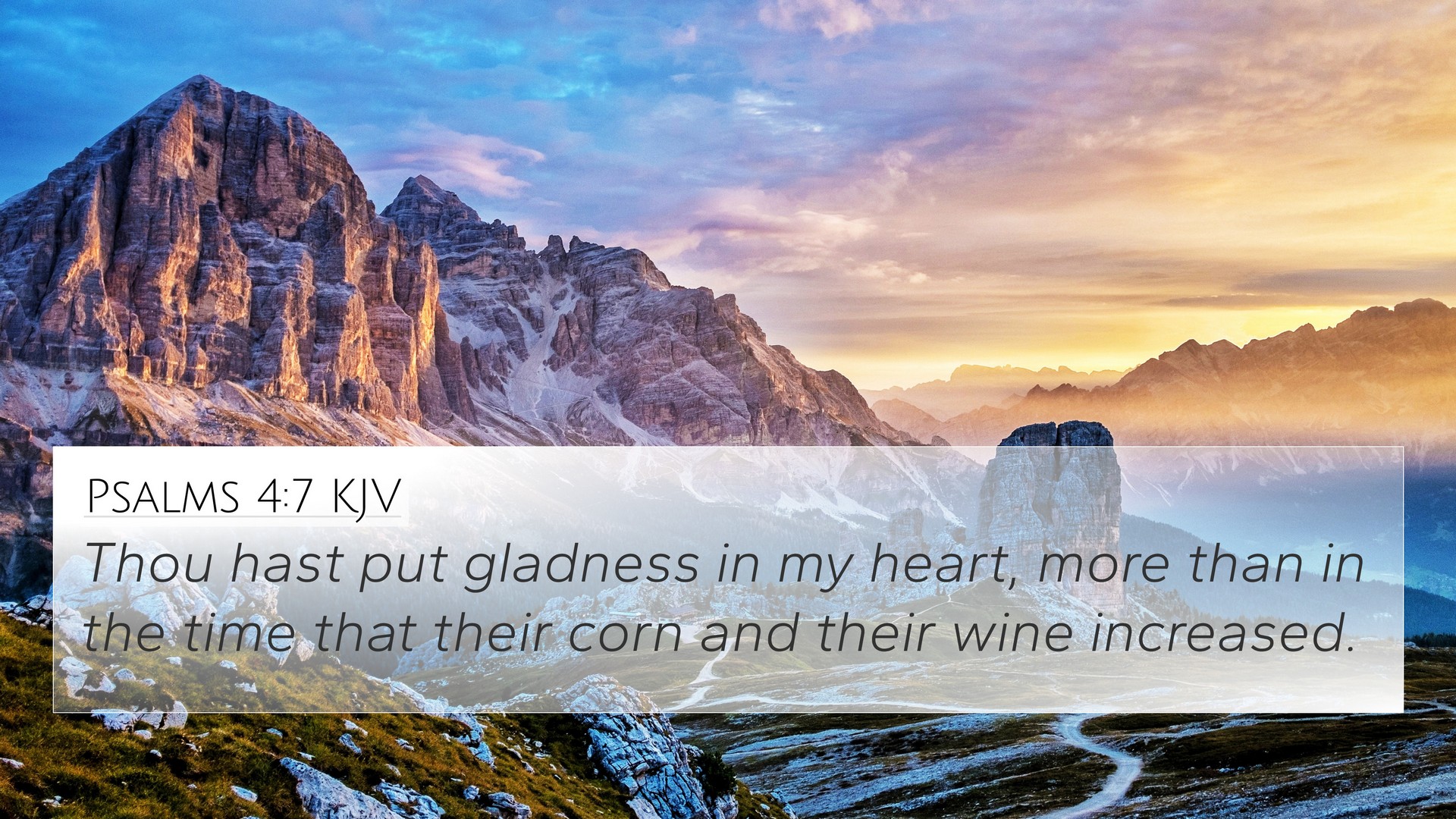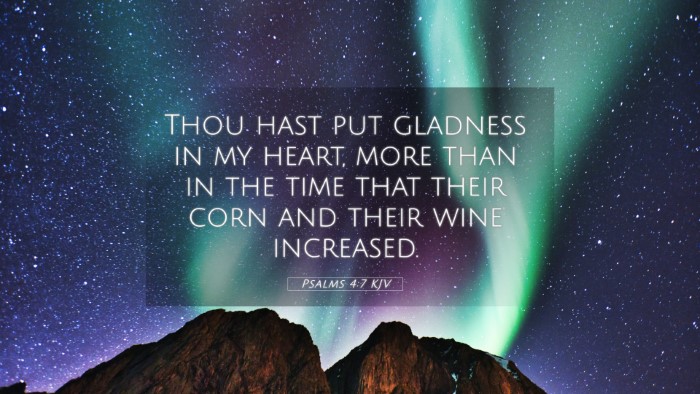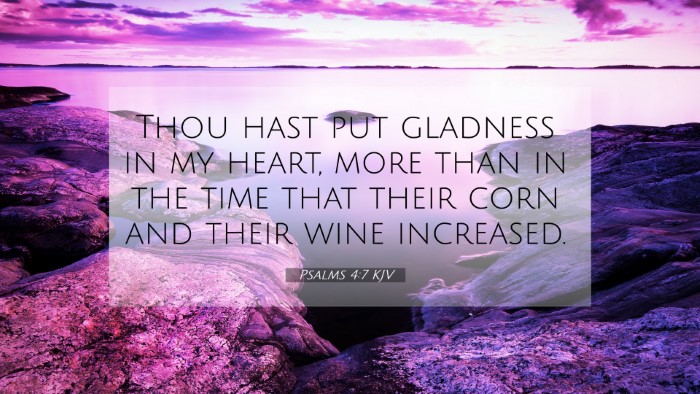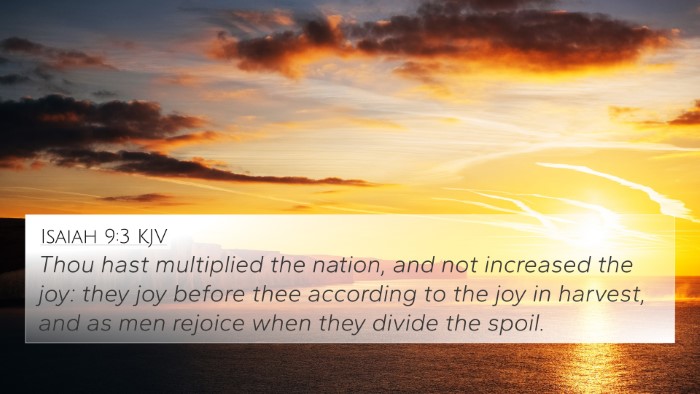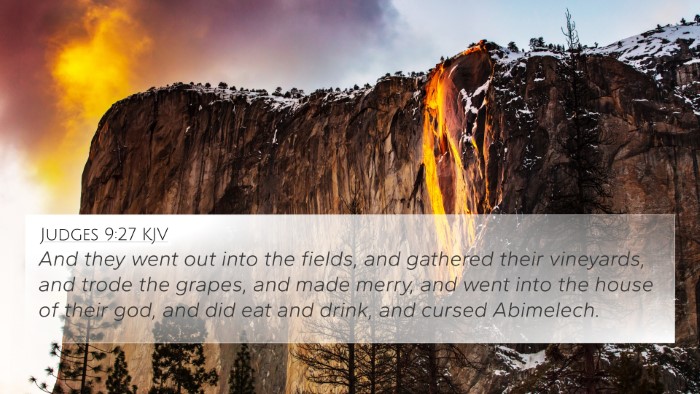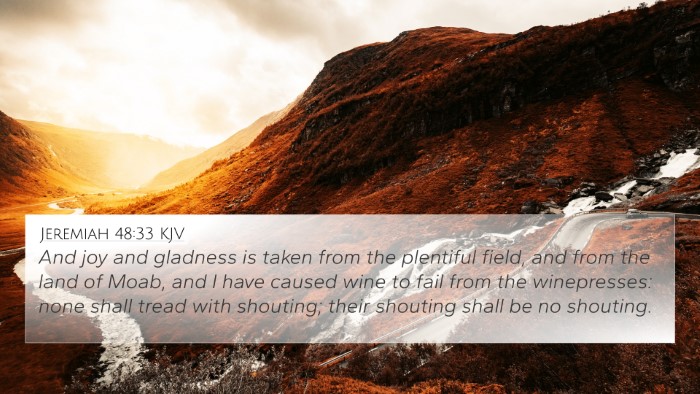Psalms 4:7 - Meaning and Interpretation
Psalms 4:7 states, “You have put gladness in my heart, more than in the season that their corn and their wine increased.”
This verse reflects the deep spiritual joy that surpasses material abundance and worldly success. It emphasizes how true contentment and joy come from a relationship with God, rather than from temporal gains.
Summarized Insights from Public Domain Commentaries
Matthew Henry's Commentary
Matthew Henry highlights that the gladness mentioned in this verse is a divine gift from God, contrasting it with the joy of earthly prosperity. He explains that while the prosperous may experience temporal happiness from their harvests, those who trust in God experience a deeper and lasting joy that originates from a relationship with Him.
Albert Barnes' Notes
Albert Barnes notes that the "gladness" mentioned signifies a state of heart that God bestows on His faithful people. He observes that this joy is profound, surpassing the happiness associated with material goods like corn and wine. Barnes emphasizes that spiritual joy is more valuable and fulfilling than the worldly pleasures derived from wealth and abundance.
Adam Clarke's Commentary
Adam Clarke elaborates on the idea that the heart’s gladness is not dependent on external circumstances. He points out that the psalmist experiences a joy that is independent of the harvest season's increase. Clarke's interpretation highlights the difference between earthly joy and the joy found in the presence and favor of God, especially through prayer and faith.
Cross-References for Psalms 4:7
- Psalm 16:11: “You make known to me the path of life; in your presence there is fullness of joy; at your right hand are pleasures forevermore.”
- Philippians 4:4: “Rejoice in the Lord always; again I will say, rejoice!”
- Romans 14:17: “For the kingdom of God is not a matter of eating and drinking but of righteousness and peace and joy in the Holy Spirit.”
- Matthew 6:19-21: “Do not lay up for yourselves treasures on earth… But lay up for yourselves treasures in heaven…”
- 1 Peter 1:8: “Though you have not seen him, you love him. Though you do not now see him, you believe in him and rejoice with joy that is inexpressible and filled with glory.”
- Nehemiah 8:10: “The joy of the Lord is your strength.”
- Psalm 126:5-6: “Those who sow in tears shall reap with shouts of joy!”
- Proverbs 10:28: “The hope of the righteous brings joy, but the expectation of the wicked will perish.”
- John 15:11: “These things I have spoken to you, that my joy may be in you, and that your joy may be full.”
- Isaiah 61:3: “To grant to those who mourn in Zion…that they may be called oaks of righteousness, the planting of the Lord, that he may be glorified.”
Thematic Connections
Psalms 4:7 serves as a profound reflection of several interrelated themes within the Scriptures, particularly focused on joy derived from God versus joy found in material possessions. This theme resonates throughout various books of the Bible, establishing a clear contrast between spiritual fulfillment and earthly pleasures.
Scriptural Cross-Referencing
The idea of spiritual joy can be traced through a plethora of related Bible verses. By employing a cross-reference Bible study approach, one can identify the connections between these passages, enhancing understanding of the biblical theme of spiritual joy. The Bible cross-reference guide can serve as a valuable resource for exploring these connections.
Understanding the Concepts
- The Importance of Spiritual Joy: Identifying how joy from God can provide strength during difficult times.
- Material vs. Spiritual Wealth: Exploring the implications of spiritual well-being compared to earthly riches.
- Role of Faith in Joy: Examining how faith influences one’s capacity for joy and contentment.
- Cross-referencing Biblical texts: Using various tools for Bible cross-referencing enhances the study and understanding of spiritual themes.
Conclusion
Psalms 4:7 encapsulates the profound truth that genuine gladness comes from God and not from earthly success. The insights gleaned from public domain commentaries illustrate the richness of this verse, allowing believers to reflect deeper on the source of their joy. By engaging in comparative Bible verse analysis and cross-referencing with related scriptures, one can further enrich their understanding of this essential biblical theme.
